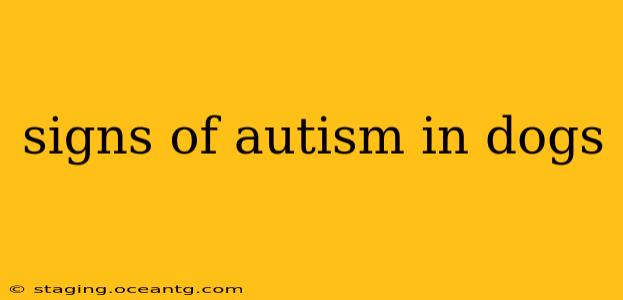While dogs can't be diagnosed with autism spectrum disorder (ASD) in the same way humans are, some canine behaviors share similarities with autistic traits in humans. It's crucial to remember that these are analogies, not a diagnosis. Attributing human conditions to animals requires careful consideration and should never replace professional veterinary advice. Instead of "autism in dogs," it's more accurate to discuss atypical behaviors that may mirror some aspects of human ASD. This article explores some of these behaviors and emphasizes the importance of veterinary consultation for any concerning changes in your dog's behavior.
What are some atypical behaviors in dogs that might resemble human ASD traits?
Several behavioral patterns in dogs can sometimes resemble traits associated with autism in humans. These include:
-
Repetitive Behaviors: Dogs exhibiting repetitive behaviors like excessive licking, chasing their tails incessantly, or engaging in compulsive behaviors (e.g., pacing, spinning) might show a similarity to repetitive actions seen in some individuals with ASD. However, these behaviors can also be caused by various factors, including anxiety, underlying medical conditions, or learned habits.
-
Sensory Sensitivities: Some dogs demonstrate heightened sensitivity to certain stimuli, such as loud noises, bright lights, or specific textures. This can manifest as fear, anxiety, or avoidance of these sensory inputs. This parallels sensory processing differences observed in some individuals with ASD.
-
Social Communication Challenges: While dogs are inherently social animals, some may exhibit unusual social interactions. This could involve difficulty reading social cues from other dogs or humans, reduced interest in playing with other dogs, or unusual responses to social approaches. However, this could also indicate other underlying issues, such as fear, lack of socialization, or even hearing or vision impairments.
-
Rigid routines and resistance to change: Dogs with a strong need for routine and predictability might show distress or anxiety when their daily schedule is altered. This is similar to the rigidity and resistance to change sometimes seen in individuals with ASD. A sudden shift in routine could lead to increased anxiety and unusual behaviors.
-
Unusual play styles or interests: Some dogs might engage in unusual play patterns or have fixated interests in specific objects or activities, engaging with them repetitively or intensely. This could be an indication of a restricted range of interests, which is sometimes associated with ASD in humans.
Is there a test to diagnose autism in dogs?
No, there isn't a diagnostic test for "dog autism." Veterinarians can't diagnose ASD in dogs. Instead, they focus on identifying and addressing the underlying causes of unusual behaviors. Through a comprehensive examination, including behavioral assessments, the vet can rule out medical conditions and identify potential triggers for the behaviors.
What should I do if my dog shows some of these behaviors?
If you notice any atypical behaviors in your dog, it's essential to consult a veterinarian. They can conduct a thorough examination to rule out underlying medical conditions that might be contributing to the behaviors. A veterinary behaviorist, a specialist in animal behavior, can further assess your dog's behaviors and recommend appropriate interventions, such as behavioral modification techniques, environmental enrichment, or medication if necessary.
Can training help dogs with atypical behaviors?
Yes, training can be beneficial for dogs exhibiting atypical behaviors. A certified professional dog trainer experienced in working with dogs with behavioral challenges can develop a customized training plan to address specific issues. Positive reinforcement techniques are generally preferred to create a safe and positive learning environment.
Are there specific breeds more prone to these behaviors?
While no breed is exclusively predisposed to behaviors mirroring human ASD traits, certain breeds might exhibit some tendencies more frequently due to genetic predispositions or breed-specific characteristics. However, this doesn't mean that dogs of other breeds cannot display such behaviors. Individual variation plays a significant role.
It's crucial to remember that unusual behaviors in dogs can stem from various sources, including medical problems, environmental factors, or lack of proper socialization. Always consult with a veterinarian to determine the cause of any concerning behavior and receive appropriate guidance. Understanding and addressing the underlying cause is paramount to your dog's well-being.
